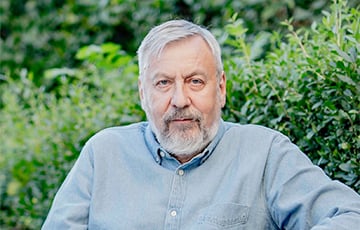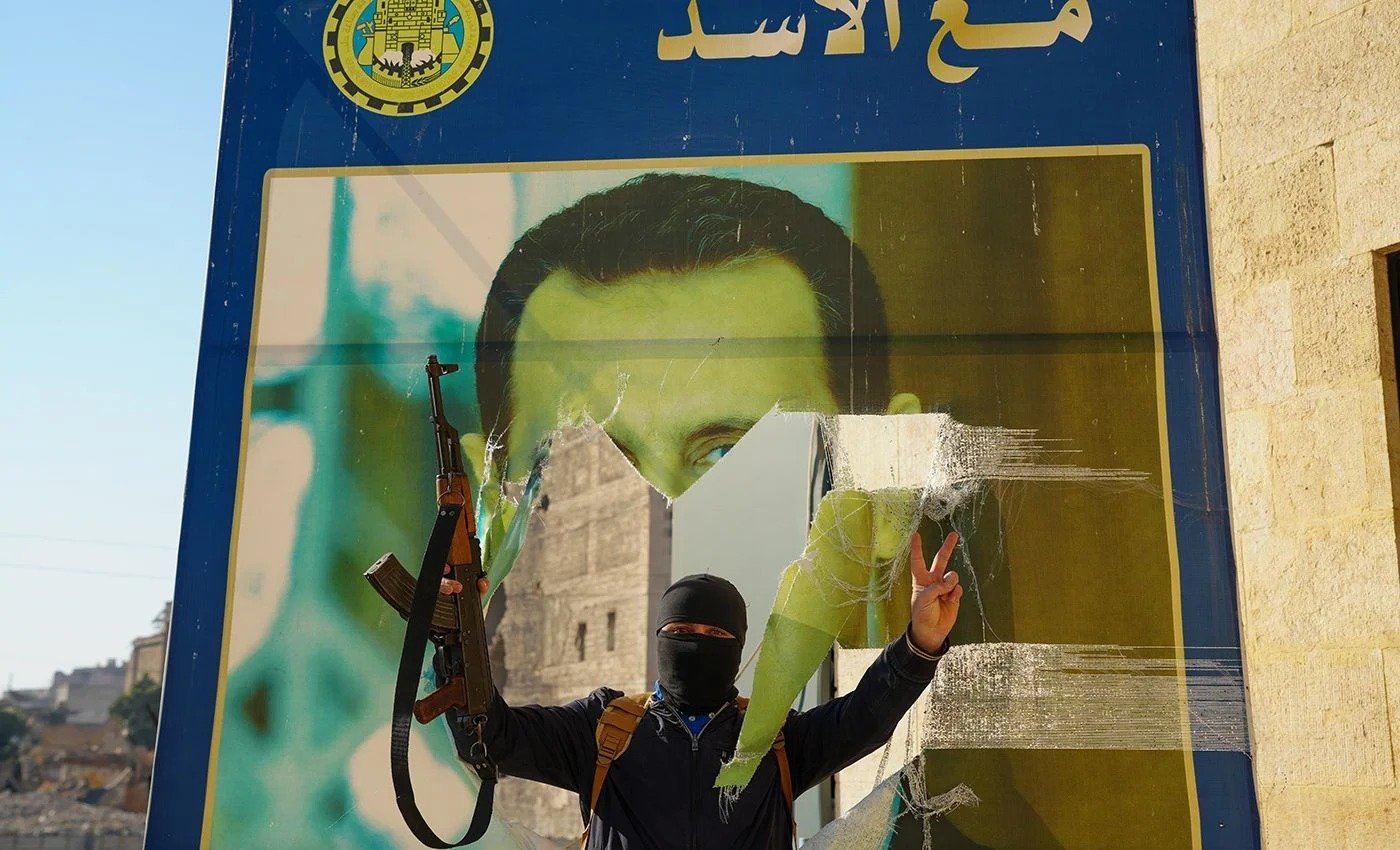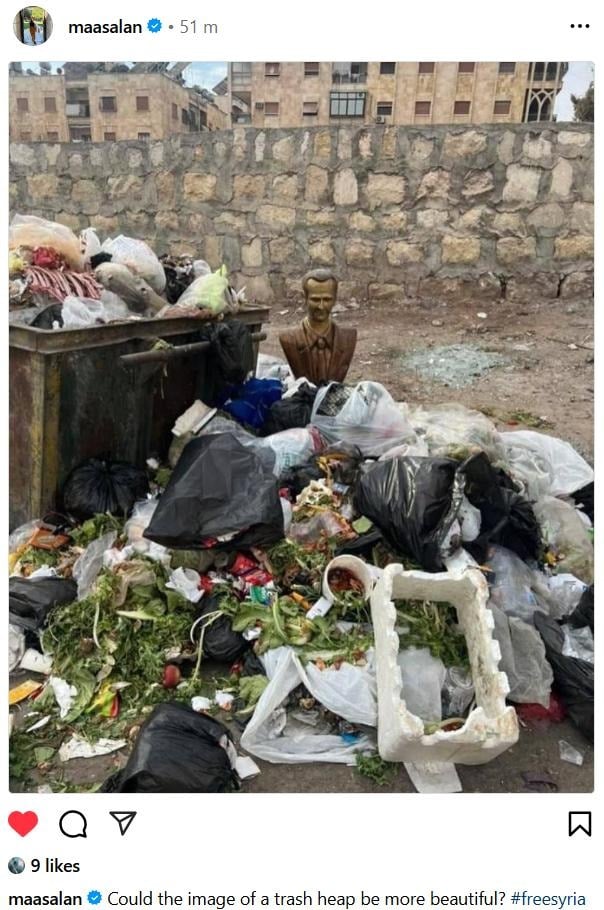Black Swan For Dictator
- ANDREI SANNIKOV
- 8.12.2024, 23:30
- 44,114

10 days that shook Syria.
That's it.
One of the most vile dictatorial regimes of the Assad family collapsed, crushing the youngest.
The revolution in Syria began in 2011, at a time when the most active participants of the 2010 uprising against the Lukashenka regime were still in Belarusian prisons.
(I do not tire of repeating that our uprising was one of the catalysts of the Arab Spring. The world is increasingly interconnected, isn't it?)
The Syrian revolution of 2011 was stifled by the betrayal of the United States (remember the “red lines” of Barack Obama, who loudly threatened a military response to the Assad regime in the event of the use of chemical weapons and cowardly forgot about his own threats); the short-sightedness of the West as a whole, who considered the Syrian conflict local; the growing influence of Islamist groups in the ranks of the Syrian opposition; and, finally, Russia's military intervention.
Assad deftly took advantage of the fact that the revolution grew into a civil war in which the terrorist groups Al-Nusra Front (al-Qaeda's branch in Syria) and the Islamic State actively intervened, and declared themselves the defender of "secularism" against jihadists.
As a result, the West was drawn into the Syrian conflict, which has already acquired global proportions largely due to the inaction of the West itself at the initial stage, not to support the moderate opposition, but to fight the Islamists, which helped Assad survive.

The result?
More than half a million dead Syrians, more than six million refugees, the global migration crisis, the growing influence of Putin and Islamists in the region and in the world, the rollback of democratic values in Europe.
Today, analysts say that preventive measures, assistance to the belligerent opposition, the introduction of peacekeeping forces would prevent a crisis of a truly planetary scale, would save the lives of hundreds of thousands of Syrians.
The parallels with the situation in our region are obvious: if preventive measures are not taken, including the deployment of peacekeeping forces in case of escalation of the conflict, the situation will get out of control. The fact that the threat to peace from the territory of Belarus is rapidly increasing is visible to the naked eye. Nuclear and non-nuclear "hazelnuts" are evidence of this.
These are the lessons of the past revolution and the civil war in Syria. Unpleasant, but useful.
The events of today, the overthrow of the dictatorship of Bashar al-Assad, teach us somewhat different, but very interesting and useful lessons.
The Assad regime collapsed, despite the support of Iran and Russia, and the non-interference of the United States. That is, the world's main villains and murderers could not help their brother and protégé to retain power.
Many groups present in the country have united against the dictatorship of Assad, from the coalition of the Democratic Forces of Syria and Hayat Tahrir al-Sham (HTS), the remnants of the Syrian wing of Al-Qaeda, which created the terrorist Al-Nusra Front, and subsequently HTS to the Druze who had previously concluded a truce with Assad.
The leader of the rebels was the head of HTS Abu Mohammed al-Julani, who, after the beginning of the revolution, regained his real name Ahmed Hussein al-Sharaa. He himself, like HTS, was declared by the United States as international terrorists, and a reward of $10 million was appointed for his capture in 2017 (still in force).
It is possible to analyze the composition and motivation of various rebel groups, which today are united under the unified command of the opposition and Islamists "Al-Fatah al-Mubin" for a long time and in detail - this is really very interesting from many points of view - but it is worth paying attention to one aspect: the ranks of the rebels and their commanders are full of people with a reputation that is far from untarnished.
Probably, in the near future we will see a lot of friction and showdown within the "liberating forces", but today the world is presented with an indisputable fact.
AT A CERTAIN MOMENT, A DICTATORSHIP SO ANNOYS EVERYONE THAT EVEN CRIMINALS RISE UP TO FIGHT AGAINST IT, AND THE PEOPLE SUPPORT THEM.
With regard to our situation, this would mean an uprising against Lukashenka, organized by his current and former security forces from the Ministry of Internal Affairs, the KGB and other special services.
From the first days of the revolution, Syrian rebels paid great attention to working with the population. In the liberated areas, many bans were lifted, electricity and water supplies increased, Christian denominations were allowed to freely conduct their services, even women were given back some of their rights, which is quite unusual for Islamists.
All this provided the rebels with popular support. The final point of the competent policy of the rebels was the capture of the Saydnaya military prison, nicknamed the "massacre", which held thousands of prisoners: civil activists and representatives of the armed opposition. They were all released.
The black swan for Assad took off on November 27, 2024 in the province of Aleppo in response to increased shelling by government forces (SAA) in the western part of the province. Ten days later, the regime collapsed. But in his last 2021 "elections", he scored a familiar to us vote of more than 95%.
The former close circle of the dictator quickly remembered democracy, and Prime Minister Mohammad Ghazi al-Jalali said that free elections should be held in Syria, and he is personally ready to contribute to the peaceful transfer of power to the rebels. This gesture was appreciated wisely, and the rebel leader Ahmed Hussein al-Shara 'announced that all state institutions in Damascus would remain under the control of the Prime Minister until the formal transfer of power.

The rebels announced the fall of the Assad regime on state television.
“In the new Syria, where everyone coexists in peace, justice prevails and truth is established, where every Syrian is valued and his dignity preserved, we turn the page of the dark past and open new horizons for the future,” they said.
I can't predict the further developments, but it is hardly possible to do today. Too many interests are intertwined in this country and in the region. And the villains have not disappeared anywhere and will not calm down.
But today is undoubtedly a significant day.
The day of the fall of the anti-people regime of killers.
In Syria, this happened in an armed way.
But it is not necessary to bring such bloody developments, if preventive measures are taken, even with the use of force.
In 2011, students wrote on the wall of one of the educational institutions in the province of Deraa in southern Syria "Doctor (Assad), now it's your turn."
Not immediately, but this sentence was executed.
It will also be executed in relation to other dictators.
Now it's your turn!
Andrei Sannikov, Facebook










